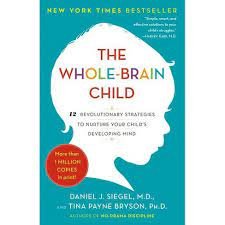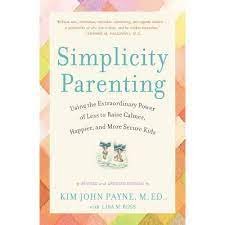Seven Books Every Parent Should Read and Why
Every bookstore has a whole section dedicated to parenting books. Why? Child development is on every parent’s mind. It’s also more complicated than a lot of people realize.
A child's growth and development necessarily keep parents on their toes, often struggling to answer a child's difficult question (Why doesn’t my friend like me anymore?) or to understand newfound competencies (I can cook by myself now, so stop helping me!), or upsetting behavior (You’re a doodoo head, mommy). Parents want guidance and reassurance that they and their child are on track.
How does a parent know what resource to trust?
Some parenting books are more broad-based and address child development from thirty thousand feet. Others center around a theme or singular issue and bring that particular topic into focus. Both types of books are effective in shaping a parent’s thinking and consciousness.
Parent education and advice is not new. For generations, parents have relied upon older and more experienced family or community members to guide their caretaking by addressing everything from breastfeeding to discipline, from normal child development to understanding temperamental differences. These smart, observant, and often formally untrained elders offered wisdom and insight and provided much-needed reassurance.
But our grandmothers and village sages no longer live nearby.
Parents often now turn to a variety of professionals trained in education, counseling, medicine, or therapy. Luckily, the world of science has exploded with innovations in pediatric care and psychological research into parenting practices; as a result, a wealth of parenting books has been brought to the market. Some reflect fashion and fads. Others draw on evidence-based research or accepted developmental theory.
With so many choices, how does a parent choose?
As the world of communication becomes more complex and immediate, its influencers more pervasive and prolific, parents need to be more discriminating. Some books that have achieved great popularity are not always based on adequately sophisticated reasoning or research. Differentiating among the overwhelming volume of “parenting advisors” and the growing number of educational products is not easy. That is the simple genesis of this article—to help you find meaningful direction in a crowded and overheated market.
Parenting From the Inside Out: How a Deeper Understanding Can Help You Raise Children who Thrive
Dan Siegel, M.D. and Mary Hartzell, M.Ed.
Siegel shows how self-understanding and self-reflection can positively influence an adult’s role as a “parent.” He explains how a parent’s attachment to their own parents can affect how they relate to their child and illustrates how a parent’s childhood experiences shape their attitudes and actions toward parenting. Recognizing the scientific evidence that history can too often repeat itself in negative family interactions, he offers self-understanding and self-reflection as helpful tools in reversing those not-so-healthy trends. Importantly, he shows parents how to enhance healthy development with step-by-step approaches to deeper self-awareness.
Needed Takeaway: An essential step in raising happy well-adjusted children is for parents to fully understand and learn from their own childhood experiences.
Thrivers: The Surprising Reasons Why Some Kids Struggle and Others Shine
Michele Bourba, Ed.D.
Bourba examines the effects of current culture on childhood, focusing on the need to establish character traits as a primary parenting goal. She identifies seven character traits common to children who thrive—confidence, empathy, self-control, integrity, curiosity, perseverance, and optimism. Importantly, she provides practical strategies to develop these traits in children from preschool through adolescence.
Needed Takeaway: Parents need to focus on building and supporting valuable core character traits in childhood, which are associated with healthy development and general well-being.
The Whole-Brain Child: 12 Revolutionary Strategies to Nurture Your Child's Developing Mind
Daniel Siegel, M. D. and Tina Bryson, Ph.D.
Taking brain-science and making it parent-friendly, Siegel demonstrates that the goal of whole-brain parenting is to help the child functionally integrate various parts of the brain. He explains how the moments that parents are trying to survive with their child are actual opportunities to help them thrive. Such moments are important opportunities for teaching about reflective listening, seeing other points of view, communication skills, and compromise and forgiveness—all while relying on brain science. The chapters are divided into helpful sections that include teaching your child about the multifaceted brain, applying the concepts to the parent’s own life and relationships, and summary charts that reflect the age and stage of the child.
Needed Takeaway: An essential goal for parents is to help the child integrate various parts of the brain through brain-based parenting practices that help children develop in healthy ways.
Simplicity Parenting: Using the Extraordinary Power of Less to Raise Calmer, Happier, and More Secure Kids
Kim John Payne, M.Ed.
Payne addresses the problem for children of having “too much,” whether from toys to books, clutter to stimulation, or choices to activities. He recognizes the resulting, if indirect, pressure on children in having too little time. Recognizing an association between experiencing “too much” and childhood difficulties, which include anxiety, stress, and behavioral problems, he argues for simplicity and decluttering in various forms and venues. He challenges parents to establish a simpler, more basic lifestyle with structured periods of calm and connection in the midst of the child's overly busy life.
Needed Takeaway: Parents must recognize the risk of their being “too much” in the lives of children, from things to activities, and consider a more simple approach to parenting and life with fewer “things” and less stimulation
The Price of Privilege: How Parental Pressure and Material Advantage are Creating a Generation of Disconnected and Unhappy Kids
Madeline Levine, Ph.D.
Levine explores the question of why children from wealthy families, who have so much material and social advantage, can feel so empty and disconnected. Noting the increasing rates of depression, anxiety, and substance abuse among such adolescents, she identifies the problems she has seen in so many seemingly confident, accomplished, and socially skilled teenagers in this group. She explains how growing up in today’s affluent families can be problematic and why it presents challenges to effective parenting. She encourages parents to cultivate a close, warm relationship with their adolescent and minimize high demands, criticism, and pressure.
Needed Takeaway: Parents must realize that affluence and the opportunities it affords children may be detrimental to their emotional well-being and that connection and understanding are the countervailing forces.
First You Have to Row a Little Boat: Reflections on Life and Living
Richard Bode
Bode’s book is not a parenting book but rather a book of reflections on life choices. Its relevance to parents is simply in its recognition of the potential of missed parenting opportunities during their child’s growing up. Eloquently written and profoundly thoughtful, Bode explains: “When I was a young man I made a solemn vow. I swore I would teach my children to sail. It was a promise never kept. The exigencies of life—money, work, location, and health—kept me from passing on to my children this legacy which I deemed to be the essence of myself. I feel as if I have left something unsaid which I ought to have said, something undone which I ought to have done. I am filled with a lore which I learned as a boy, and I failed to pass it on to my sons and daughters...” Focusing on foundational truths found in the small inviolate rules that govern sailing, the book indirectly challenges parents to become more thoughtful and specific about their discovered truths and consider how best to pass those along to their children.
Needed Takeaway: Parents must think meaningfully to realize the things they want to teach their children by making concrete plans to share non-directive activities and easy conversation throughout childhood.
Childhood Narcissism: Strategies to Raise Unselfish, Unentitled, and Empathetic Children
Mary Ann Little, Ph.D.
I can’t leave this list without putting in a good word for my own book, which hits the shelves November 11. Childhood Narcissism identifies the early warning signs that can result in a full-blown narcissistic disorder in adulthood. As narcissism is most often anchored in childhood, waiting too long to address these tendencies can be costly.
Childhood Narcissism explores four psychological structures developing over childhood that nurture a child’s healthy, realistic self-concept and positive model of love and relationships. Based on the latest research and theory, the book identifies four parent types that can promote narcissistic development and how these approaches to parenting can create demanding children who do not see themselves realistically and struggle to build and sustain relationships.
Needed Takeaway: Narcissists-to-be (N2Bs) either receive “too much” or “too little” of an essential something in their growing up. “Moderation parenting” is shown to be the key to raising empathetic, unentitled, and caring children.






